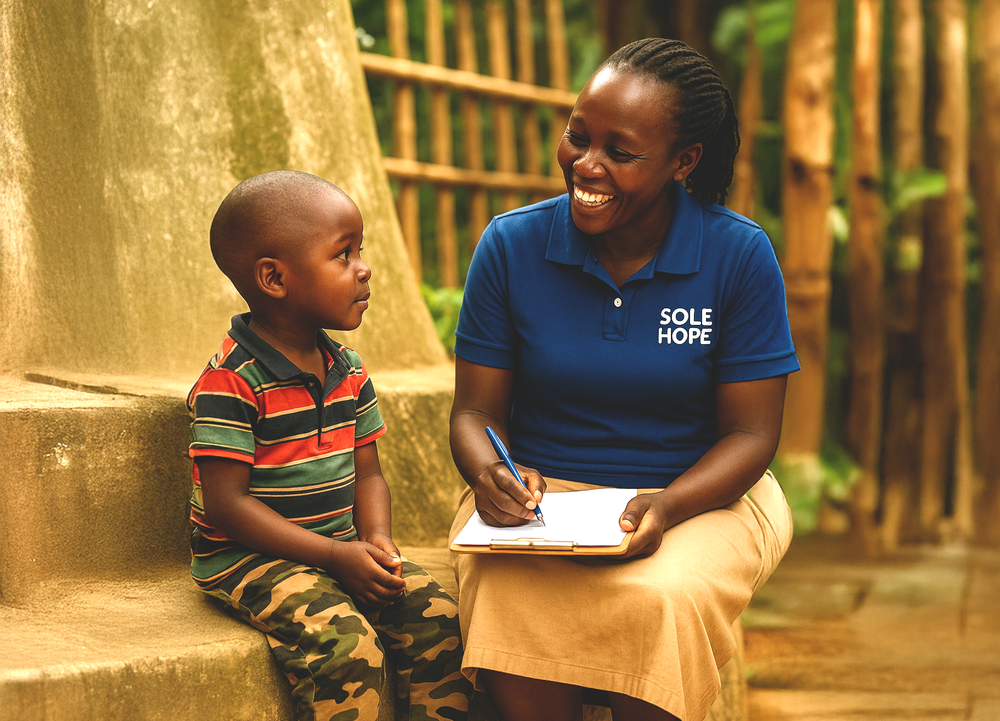How your support helps children walk in freedom.
Sole Hope helps children and families in Uganda heal from painful foot conditions through medical clinics, the Hope Center, education, jobs, and whole person care. Together we stop the cycle of suffering and restore dignity one life at a time.
On this page, you will see how your generosity moves from a simple gift to real change in a child’s life.
Our approach.
In rural Uganda, children suffer from a tiny parasite called a jigger that burrows into the skin and feeds on blood. The pain can be severe. Many children stop walking, stop going to school, and begin to believe they are forgotten.
We are one of the only organizations in the world addressing jiggers at their source through medical care, education, protective shoes, and whole person support.
Every step of our work is led by local Ugandan staff, focused on long term relationships, and built around the simple belief that every child is created with dignity and worth.
What your support makes possible:
- School and community clinics where feet are washed and jiggers are removed.
- The Hope Center, a short term residential space for children with severe cases.
- Community education and social work that reduce stigma and prevent future outbreaks.
- Shoemaking jobs for Ugandan artisans who craft protective shoes from denim and recycled tires.
- Counseling and mental health care for children carrying trauma, shame, and fear.
Healing starts with gentle, consistent care.
Every week, our teams wash the feet of hundreds of children and families at schools and community clinics. We provide gentle footwashing, jigger removal, education, and shoes that protect healing feet.
Many of the children we see have been in pain for months. Some have been mocked, called cursed, or seen as untouchable. At clinic, they are welcomed by name, cared for with patience, and reminded that they are seen and loved.
Our clinics offer:
- Footwashing, jigger removal, and wound care.
- Basic medical treatment for infections.
- Education for students, parents, and teachers.
- Referrals to the Hope Center for severe cases.


Short term residential care for the most severe cases.
Some children arrive at clinic with jiggers so severe that walking is nearly impossible. Their feet and legs are swollen, infected, and deeply painful. These children are welcomed to the Hope Center, a short term residential program where they can heal.
At the Hope Center, children receive:
- Multiple days of careful jigger removal and wound care.
- Nutritious meals and a safe place to rest.
- Clean beds, clothing, and the chance to simply be a child again.
- Protective shoes before they return home.
Our team also connects with families, checks on living conditions, and prepares for follow up care so that healing continues after a child leaves the Hope Center.
Stopping the cycle with truth, support, and practical tools.
Jiggers are preventable, but they thrive where there is poverty, low awareness, and stigma. Many children with jiggers are called curses or treated as if they are at fault. This stigma harms their confidence, sense of belonging, and even their faith that anyone cares.
Our education and social work teams help change the story by:
- Teaching schools and communities how jiggers spread and how to prevent them.
- Sharing simple hygiene and floor care practices that families can use at home.
- Offering emotional support to children and caregivers who have carried shame and fear.
- Connecting families to ongoing resources and follow up visits.
When communities understand the problem, children are more protected, and the next generation has a chance to grow up without the same pain.


Protective shoes that prevent reinfestation and provide steady work.
Protective shoes are a key part of healing. Without them, children are at high risk of being reinfested. That is why every pair of Sole Hope shoes is made with care in Uganda by local artisans.
Our shoemaking workshop:
- Uses denim uppers cut at shoe cutting parties around the world.
- Finishes each pair with durable soles made from recycled tires.
- Provides fair wages and meaningful jobs for shoemakers and tailors.
- Ensures that children who receive treatment also receive protection for the future.
Every pair of shoes you help provide does double work. It protects a child’s feet and supports a Ugandan family.
Caring for the heart, not only the feet.
Physical pain is only part of the story. Many children carry deep emotional wounds from years of being mocked, isolated, or called cursed. Families carry worry and shame. In Uganda, access to mental health care is extremely limited, especially for children.
Sole Hope staff walk with children and caregivers through:
- One on one conversations that help children process fear, shame, and trauma.
- Practical encouragement that reminds families they are not alone.
- Referrals and partnerships as we work toward expanded mental health care through the Brighter Days initiative.
Our vision is simple. When a child leaves Sole Hope, we want them to walk away not only free from jiggers, but also more confident, hopeful, and secure in their worth.

Healing feet. Restoring dignity. Offering hope.
From the first footwashing at a school clinic to the final pair of shoes at the Hope Center, your support is present in every step. Together we can remind every child in Uganda that they are seen, known, and never forgotten.
See how you can get involved